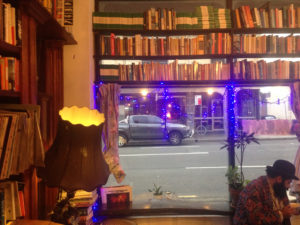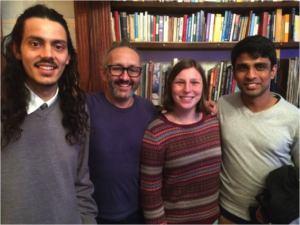Ravi Prasad – owner of Parliament on King

When Sydneysiders think of King Street, they might think of the eccentric characters, trendy coffee shops, vintage clothing stores and quality restaurants. A short 1 km walk from the AFFMA offices (located near Newtown Station), on the quieter south end of King Street sits a quirky coffee shop with a difference. Parliament on King is changing people’s lives, one refugee at a time.
The coffee shop / book store / meeting place / community hub can be found at 632 King Street and employs and trains refugees and asylum seekers so that they can have a smoother and more comfortable transition into Australian society. Myself (James Gounis) and fellow AFFMA volunteers Megan Sturges and Vijhai Utheyan caught up with the co-owner of Parliament on King, Ravi Prasad, to hear first hand what the coffee shop does and how it has a positive impact on so many refugee and asylum seekers’ lives in Sydney.
About Ravi and the work of Parliament on King
Ravi joked with us that he set up the café during a ‘mid-life crisis’. He actually came up with the idea when he was first seeing his wife-to-be, when riding around the city togoether on a Vespa looking at corner stores, book stores and coffee shops. He and his wife discussed the idea of one day owning a house with a shop-front that could act as a book store, coffee shop and community meeting point.
When living in a unit with his wife and two children, the couple decided to chase their dreams and began looking for the ideal place. Ravi always had an interest in race relations and the racial undercurrent within Australian society, particularly when he was growing up. His father would experience racism on the streets of Adelaide, and his mother was arrested during the dramatic protests in the 1970’s when the national Rugby Union team of South Africa, the Springboks, toured Australia during the Apartheid era. Ravi has always held strong views on social justice and race relations and he and his wife decided that a café set up to help refugees and asylum seekers learn vital skills and feel welcome was what they wanted to do.
“Refugees and asylum seekers leave everything behind when they make the courageous decision to leave their homelands. They leave their networks, their families, their communities, their educational qualifications, fleeing for their life” Ravi mused. Ravi further noted that whilst giving up so much already to travel here, asylum seekers that are eventually recognised as refugees in Australia and make it out of detention centres and into the community are “left on their own to start a new life, without family networks, educational qualifications, work experience and job references”. Ravi was aware that some refugees may feel disempowered in their new homeland and need paid employment as the majority do not want to live on welfare. Recognising these extreme difficulties spurred Ravi and his wife on to create the amazing café and community hub that stands today.
Ravi further reflected that asylum seekers and refugees are a “client of everyone”. So instead of setting up a café that employed them and had Ravi and his wife as “the boss”, the café and catering business operates to ensure all employees and volunteers are treated equally. The purpose of this is to, in Ravi’s words, “create social, cultural and economic empowerment and participation through providing, training, work experience and paid work” in a welcoming workplace. He provided us with the example that just today (22 September 2016), three refugees landed kitchen jobs at the café, paid at a very competitive rate that is much more substantial than a lot of the hospitality work Ravi has heard about from his contacts, where refugees and asylum seekers are often exploited and paid below minimum wage.
Ravi and his wife operate their café and catering business employing refugees as equals. The employees are encouraged to “express and share their culture, stories, heritage and cuisines”. The employees set the menu and management of the business operates as more of a bottom up approach. The catering side of the business, whilst often providing sandwiches for corporate clients, is well known for providing traditional dishes from the homelands of the refugee employees.
The café in the local community
The café has developed a strong community following in the local community. Every 6-8 weeks the café hosts a dinner night where refugees prepare traditional dishes and around 50 people pay $25 a head to get involved in the celebrations. The next dinner will be held in October (date yet to be decided so keep tuned into the Parliament on King facebook page). The theme of the dinner is stated by Ravi, very tongue-in-cheekly as “Dinner with everyone that Pauline Hanson would like to exclude from Australia”.
The café hosts other events such as the life drawing class scheduled for tonight also (22 September 2016). The café has received a huge amount of support from the local community and volunteers are able to use their own skills and ideas to help the refugees. Recently a young 20-year-old volunteer and customer of the café suggested to Ravi that she could teach a photography class to the refugee employees. The volunteer did not have enough digital SLR cameras so Ravi, on her suggestion, posted on the Parliament on King Facebook page requesting some assistance from the community and three cameras were donated in no time. The same happened for a sewing class, where one machine was needed and seven ended up being donated.
Prominent people from all walks of life also frequent the café, including musicians, actors, politicians and other celebrities. Even as we were chatting with Ravi, multi ARIA award winner Joseph Tawadros walked in to catch up with Ravi. Everyone is welcome at Parliament on King and local mums, dads, families, students, workers, volunteers all drop in to catch up and socialise. The café has a remarkably friendly vibe.
Certain agencies are strong supporters of the café, often arranging their corporate catering including various NSW Government Departments, St Vincent’s Hospital, School for Social Enterprise, Randwick City Council, University of Technology Sydney and many more. Recently the café catered its largest event yet for the Jewish Board of Deputies. Ravi notes that the café receives lots of support from various faith based organisations, noting that it’s all about “human rights issues, not religious beliefs of being on the left or right side of politics”. The catering for the Jewish Board of Directors provided approximately 60 hours paid employment including preparation time and service hours for the event.
Challenges faced
Ravi explained to us that he had never run such an enterprise before and that basically “everything is a challenge”. He commented that he is “constantly learning” but was quick to point out that he “really enjoys” what he is doing and wants to be able to continue in this role “indefinitely”.
Some specific challenges Ravi told us about included the logistics of operating such an enterprise, understanding how everything works (including kitchen and café equipment) and the compliance burdens faced (including waits of up to 9 months for a liquor licence, 4 months for outside seating permission and 8 months for the initial development approval for the café).
How can you get involved?
Ravi was very clear when he said that “anyone is welcome to help”. Ravi appears willing to listen to any idea a volunteer may have, providing they can provide a skill or service that will assist in developing the skills or knowledge of his refugee employees (see the photography class and sewing class as an example). If you have an idea that you think can help out Ravi and his employees, feel free to contact him here:
http://www.parliamentonking.com/contact
An example of how a member of the community assisted the café is Susan, a member of the local Catholic parish. Susan suggested to Ravi that the corporate catering packages provided could be packaged together in a full cultural experience, and thus “Soul Foods Dinner” was born. Susan also had a contact at the Canterbury-Bankstown RSL who, through their community funding arrangements, now offers refugee employees of the café free access to full day training in RSA, Barista, Food Safety, Food Supervisor and other training that was previously provided at the cost to the business.

Parliament on King’s future and mission
Ravi reiterated to us that he wants to maintain the café’s “social mission”. He understands that there is a limit to the size of the enterprise and he does not want to risk losing the community feel of the business by expanding to a commercial scale. This is understandable. Ravi is happy for the business to continue helping refugees find work and a place to feel welcome. He described how rewarding it is to see refugees use the business not only to gain skills in the kitchen or in the café, but to develop their language skills and move into employment in fields of their interest or education from back home.
Ravi says he knows the café is still achieving its mission when a refugee employee feels so comfortable working there that she then recruits her sister, brother and mother to contribute to the cooking of meals for one of the recent dinners. Ravi reflects that the café provides an environment “safe enough for someone to involve all of their family members, feel economic empowerment by getting paid, and enjoying themselves at the same time, laughing, eating, talking and sharing stories”.
We asked Ravi what he thinks the biggest impact the café has on his refugee employees. He responded poignantly, advising us to “seek out their opinions, listen to their voice, as too many people talk on behalf of refugees”. We hope to take Ravi’s advice and interview some of the employees in coming newsletters.
Further information and upcoming events can be accessed through the cafe’s Facebook page: https://www.facebook.com/ParliamentOnKing/
James Gounis, LLB, DipLegPrac.


